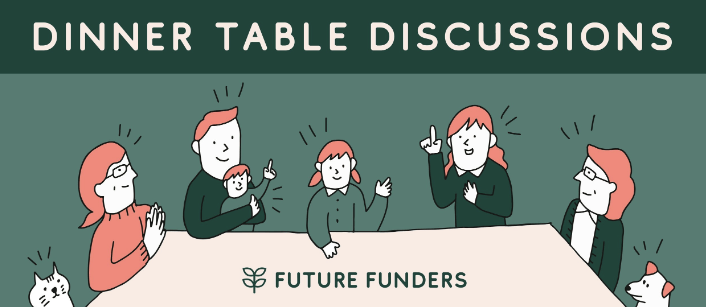📣 Guess who’s back at the table?
Dinner Table Discussions is back—and we’re thrilled to keep serving up bite-sized, practical money insights to help you build a healthier financial future for your family.
Our focus? Real-life money habits. Smarter decisions. And progress you can actually feel.
Got a topic you’d love for us to cover? Take 10 seconds (right now!) and reply to this email with your question or curiosity. We read every one, and your idea might just inspire a future issue.
Let’s get to work! 🍽️
Welcome Back, Future Funder!
When it comes to money, most of us don’t need more knowledge—we need new habits. But here’s the thing:
Change feels hard. And so we say the seven most expensive words in personal finance:
“We have always done it that way.”
This week, we’re taking a hard look at what’s really draining your bank account—and how the path to financial peace starts by questioning your defaults.
Inside today’s issue:
✅ The seven deadly words of spending
✅ How to spot outdated money habits in your bank statement
✅ Small changes that lead to serious long-term wealth
Let’s rewrite your habits—and your future.
Bon a petit! 🧑🍳
Stock market news, but make it funny
Tired of reading finance news that makes you want to rip your hair out?
Finance Wrapped brings you the most important, pressing news stories three times a week—but its real goal is to make you laugh.
The newsletter sends you developing stories, investing memes, and market reads across finance, tech, and policy every week.
If you’re ready to get your investing news in a way you can actually enjoy, sign up now.
🍽️ Main Course: The most expensive mindset in personal finance
The phrase “we have always done it that way” comes from the business world.
→ It’s a warning: keep doing things the same way, and you’ll get left behind.
In personal finance? It’s worse.
It means staying in survival mode when you could be thriving.
It means paycheck-to-paycheck when you could be saving.
It means staying in debt or not achieving financial dreams
It means habits that feel normal but cost you your future.
🔍 Sound familiar?
💬 “That’s just not how I roll.”
💬 “Yeah, budgeting works for some people, but not for me.”
💬 “I just need that daily coffee / takeout / [insert vice here].”
💬 “If it ain’t broke, don’t fix it.”
Bottom line: If you're not where you want to be financially, it is broken. You just got used to it. Over half of America lives paycheck to paycheck—do you? And are you ready to change that?
💥 What your bank statement is trying to tell you
If we pulled up your last 30 days of spending, what would we see?
Here are some habits that say “we’ve always done it that way” loud and clear:
1. Dining out 4x a week on a tight budget
🍔 You don’t need to cut it entirely, but cutting it in half could free up $100+ a month.
Fix it: Learn to cook 2 core meals. Meal prep = massive savings.
2. No savings—none, zero, nada
📉 If your income is tight, it’s tempting to think savings come later. But if you don’t start now, you won’t start at all.
Fix it: Automate $10/week in savings. Don’t wait for a big raise to build the habit.
3. Subscriptions you forgot about (or can’t justify)
📺 Netflix, Hulu, Max, Spotify, Duolingo, Peloton, etc. It adds up fast.
Fix it: Audit your subscriptions quarterly. Keep one (maybe).
4. Vices that drain your wallet and your willpower
☕ $6 lattes, daily vape cartridges, “just one” drink that turns into three.
Fix it: Be honest: what’s it costing you? And what’s it replacing in your goals?
5. Buying things you “always” buy
🛍️ Do you really need new clothes this month?
Fix it: Try a 30-day buy-nothing challenge (just food, bills, and essentials).
6. Saying yes to every social invite
🍻 Peer pressure isn’t just for teens.
Fix it: Propose cheaper alternatives or limit going out to once a week.
7. No plan for extra income
📉 Waiting on a raise instead of exploring a side hustle, creative outlet, or skill upgrade.
Fix it: Set aside 1 hour/week to brainstorm or build.
Main point: Your statement isn’t just showing what you spend. It’s showing what you believe.
And what you tolerate.
💡 Why change is worth it—even if it’s uncomfortable
As Dave Ramsey says:
“If you will live like no one else, later you can live like no one else.”
Change is hard. Especially if you’ve been surviving for a long time.
But if you want different results, you need different actions.
And sometimes that starts with a single question:
“What if I didn’t do it that way anymore?”
🌟 Bringing it home
✅ Default habits cost real money – Especially when they go unexamined.
✅ Small shifts = big impact – Audit your bank statement, trim excess, reroute spending toward your goals.
✅ You are not stuck – You’re just used to the way things are.
✅ Discipline now = freedom later – But only if you start.
Bottom line: "We’ve always done it that way" might be the real reason you’re not moving forward.
Break the loop. Your future is waiting.
Cheers to getting 1% better each week! 🥂
👂 We’d love to hear from you
What did you think of today's email?
👂 Got a habit you broke that changed your finances?
We’d love to hear about it—and your story could help someone else do the same.
Just hit reply and share.
Thanks for reading,
—Your friends @ Future Funders 🍽️
P.S. Forward this to a friend who still has 4 streaming services and no savings account. 🙃

